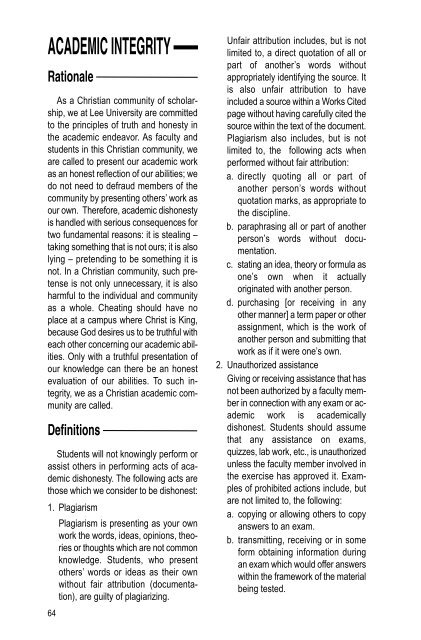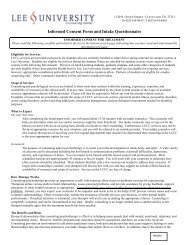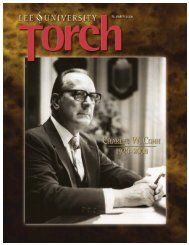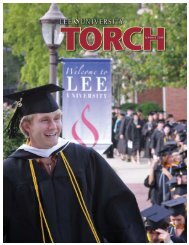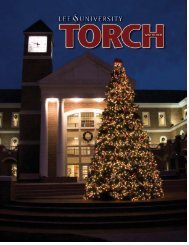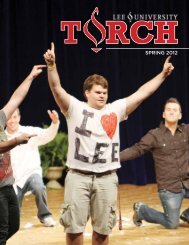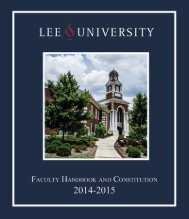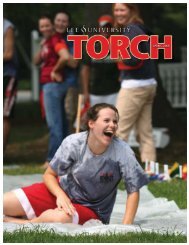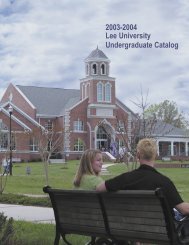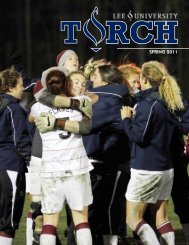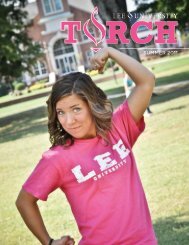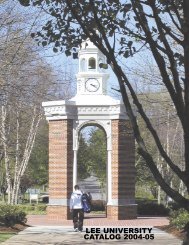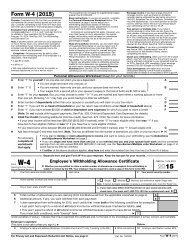Student Handbook - Lee University
Student Handbook - Lee University
Student Handbook - Lee University
You also want an ePaper? Increase the reach of your titles
YUMPU automatically turns print PDFs into web optimized ePapers that Google loves.
aCadeMiC inTeGriTyrationaleAs a Christian community of scholarship,we at <strong>Lee</strong> <strong>University</strong> are committedto the principles of truth and honesty inthe academic endeavor. As faculty andstudents in this Christian community, weare called to present our academic workas an honest reflection of our abilities; wedo not need to defraud members of thecommunity by presenting others’ work asour own. Therefore, academic dishonestyis handled with serious consequences fortwo fundamental reasons: it is stealing –taking something that is not ours; it is alsolying – pretending to be something it isnot. In a Christian community, such pretenseis not only unnecessary, it is alsoharmful to the individual and communityas a whole. Cheating should have noplace at a campus where Christ is King,because God desires us to be truthful witheach other concerning our academic abilities.Only with a truthful presentation ofour knowledge can there be an honestevaluation of our abilities. To such integrity,we as a Christian academic communityare called.definitions<strong>Student</strong>s will not knowingly perform orassist others in performing acts of academicdishonesty. The following acts arethose which we consider to be dishonest:1. PlagiarismPlagiarism is presenting as your ownwork the words, ideas, opinions, theoriesor thoughts which are not commonknowledge. <strong>Student</strong>s, who presentothers’ words or ideas as their ownwithout fair attribution (documentation),are guilty of plagiarizing.64Unfair attribution includes, but is notlimited to, a direct quotation of all orpart of another’s words withoutappropriately identifying the source. Itis also unfair attribution to haveincluded a source within a Works Citedpage without having carefully cited thesource within the text of the document.Plagiarism also includes, but is notlimited to, the following acts whenperformed without fair attribution:a. directly quoting all or part ofanother person’s words withoutquotation marks, as appropriate tothe discipline.b. paraphrasing all or part of anotherperson’s words without documentation.c. stating an idea, theory or formula asone’s own when it actuallyoriginated with another person.d. purchasing [or receiving in anyother manner] a term paper or otherassignment, which is the work ofanother person and submitting thatwork as if it were one’s own.2. Unauthorized assistanceGiving or receiving assistance that hasnot been authorized by a faculty memberin connection with any exam or academicwork is academicallydishonest. <strong>Student</strong>s should assumethat any assistance on exams,quizzes, lab work, etc., is unauthorizedunless the faculty member involved inthe exercise has approved it. Examplesof prohibited actions include, butare not limited to, the following:a. copying or allowing others to copyanswers to an exam.b. transmitting, receiving or in someform obtaining information duringan exam which would offer answerswithin the framework of the materialbeing tested.


